Programme
Programme structure and mobility
First year
During the first semester at Ghent University, students are taken through the value chain of raw materials, and are introduced to the sustainability challenges of the circular economy. Students learn to develop novel technologies to recover and extract precious metals and raw materials from waste streams and learn to create new technologies to mine materials in a sustainable way. Students take a 3-weeks course on the chemical principles and sustainable technologies along the raw materials value chain at TU Freiberg in September.
During the second semester at Uppsala University, students are trained in georesource exploration and entrepreneurship, and are stimulated to excel in creativity with an entrepreneurial mindset and innovative problem-based technology development skills. All students move as a cohort between all three partner universities in the first year which has significant networking and social cohesion advantages.
During the first part of the summer, students follow the second part of the chemical principles and sustainable technologies along the raw materials value chain course at TU Freiberg. The course covers fundamentals in chemistry of ore deposits, kinetic aspects of precipitation and extraction, and chemical foundations of metallurgical processes. Students are made familiar with applications in hydro- and pyrometallurgical processing and recycling technologies.
Second year
During the third semester, students choose a major consisting of mandatory and optional courses in a particular field of sustainable and innovative natural resource management. Students follow the major at one of the three partner universities.
Please note: The majors shown here relate to the SINReM cohorts starting from 2024. The two existing majors at Ghent University will then be merged into one: ‘Circular Societies’.
Click ‘+’ image below to discover more about the different majors.
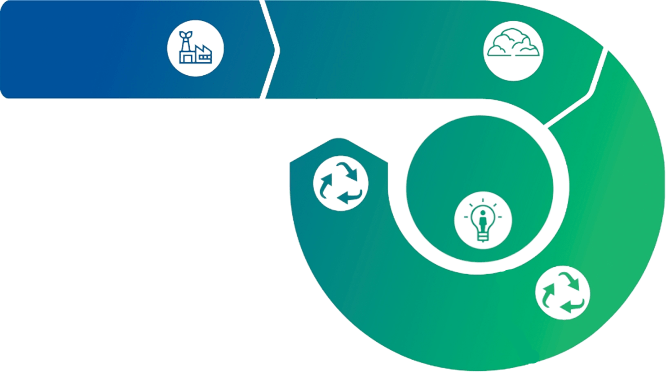
exploration
Uppsala University
Georesource exploration, Uppsala University
The major Georesource exploration offered at Uppsala University involves cutting-edge research in the areas of geophysical and mineralogical-geochemical exploration of mineral deposits. Uppsala University has expertise in mineralogy, petrology and geochemistry applied to mineralization and ore deposits as well as mine waste for critical elements. SMART Exploration, a horizon 2020 project, focuses on innovative developments in geophysics with application to the mining industry. Researchers develop 3D geophysical models of ore deposits and investigate the role of the physical properties of the rocks. Collaboration ensures integration of geophysical results with the broader context provided by geological and mineralogical perspectives. Research into induced seismicity targets the hazards of mining and others consider the sustainability issues. From the environmental perspective researchers are involved in projects such as NITREM that investigates the extraction of nitrogen from mine waste. Other researchers are active in understanding the mineral supply chain as well as sustainable development related to mines and mining.
The master dissertation should focus on geological, geochemical or geophysical exploration, including mineralogy, critical minerals and metals. Other aspects involve management of primary resources (mines and exploration sites), urban mining and mineral supply, environmental aspects of mining and environmental baselines for potential mine sites as well as sustainable development issues related to mines and mining.
TU Freiberg
Sustainable processes, TU Freiberg
The major Sustainable processes offered at TU Freiberg focuses on the different stages of the mineral processing pathway: from the exploration of new deposits; the development of alternative energy technologies and materials; to the recycling and management of resources. TU Freiberg is the only European university that operates their own underground research and teaching mine, and as the oldest mining university in the world. TU Freiberg is involved in interdisciplinary research projects such as in-situ bioleaching and refining of strategically important metals such as indium and germanium (especially relevant as both elements were discovered at TU Freiberg). Whenever possible, research projects commercialise their results through start-up companies such as PARFORCE, which produces phosphoric acid from waste materials.
Master dissertation projects can come from a wide variety of fields but should focus on the science and/or engineering aspects of materials processing. At the department of Mineral Processing Machines comminution and the sorting of raw materials can be studied. Due to the large number of industrial partners, experimental investigations using full size industrial machines is possible for students. In the Chemical Technology, Inorganic Chemistry and Biology departments, hydro- and biohydrometallurgical mineral leaching and recycling methods are being developed to extract strategically important metals from primary sources or secondary raw materials such as tailings and old batteries. This research has resulted in two start-up companies in recent years. The treatment of aqueous process streams can be studied in the department of Process Engineering. Amongst other topics, research focuses on selective separation of strategically important elements from polymetallic streams using membrane techniques. The Non-ferrous Metallurgy department focusses on the development of electro-winning and refining procedures as well as pyrometallurgical methods on both the lab and pilot plant scale.
Through industrial partnerships, there are opportunities to complete a master dissertation at partner institution such as one of the nation-wide Helmholtz Centres, or companies such as Aurubis, Europe’s largest copper producer. TU Freiberg also has strong links to the production industry, allowing students to produce end-stage products such as sensors and semiconductor technologies relevant to the mining and recycling sector.
Ghent University
The major Circular societies offered at Ghent University focuses on re-engineering the value chain, as well as designing sustainable processes, systems and new business models for evolving towards a circular society. Therefore, data on e.g. flows of materials within the society are collected, analysed, and processed, and the sustainability of these novel processes and systems is assessed. Prevention of waste generation is targeted, and generated wastes are explored as potential new resources. Hence, students also focus on the application and development of resource recovery and recycling technologies and the development of more sustainable materials in order to make the raw materials value chain more sustainable. Particular attention goes to the management of societal changes, aligned with the sustainable development goals.
The master dissertation should fit into this scope. Mandatory courses deal with sustainable management of resources in the circular economy (including e.g. industrial symbiosis). Elective courses focus on e.g. life cycle assessment, environmental legislation, sustainable waste(water) treatment, resource recovery, mobility & transport, innovative materials, or renewable energy.
Uppsala University
Sustainable entrepreneurship, Uppsala University
The major Sustainable Entrepreneurship offered at Uppsala University offers teaching and training to become entrepreneurs and to understand the essence of sustainable business development in general as well as in established companies. Teaching is organized as joint classes with students from Entrepreneurship School and Master in Industrial Leadership and Innovation with three courses, the first one, Technology-Based Entrepreneurship, covers analysis of business opportunities as well as start-up and operation of entrepreneurial processes based on new technical knowledge and new technical capabilities. The second course, Organising Knowledge-Intensive Work, focuses on conceptual frameworks and experience-based approaches within the organisational field, and evaluate their relevance for understanding knowledge-intensive work. The third course, Technology-Based Business Models for Circularity covers business models and their fundamental components, including analysis of current circular business models used in different technology-intensive industries.
The students will work on group assignments designed to illustrate important and critical sustainability challenges in the raw materials industry.
The master thesis can either be focusing on starting of a new venture in the raw materials industry, covering market research, co-creation and funding aspects of starting a new company, or contribute to sustainable technology and business development in an established company. Each fall interested companies or research groups from partner universities are invited to present thesis project proposals to the students in the Sustainable Entrepreneurship major.
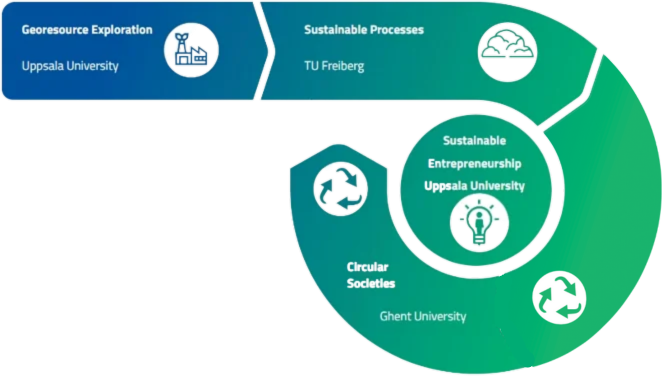
Click ‘+’ below to discover more about the different majors.
Georesource exploration Uppsala University
The major Georesource exploration offered at Uppsala University involves cutting-edge research in the areas of geophysical and mineralogical-geochemical exploration of mineral deposits. Uppsala University has expertise in mineralogy, petrology and geochemistry applied to mineralization and ore deposits as well as mine waste for critical elements. SMART Exploration, a horizon 2020 project, focuses on innovative developments in geophysics with application to the mining industry. Researchers develop 3D geophysical models of ore deposits and investigate the role of the physical properties of the rocks. Collaboration ensures integration of geophysical results with the broader context provided by geological and mineralogical perspectives. Research into induced seismicity targets the hazards of mining and others consider the sustainability issues. From the environmental perspective researchers are involved in projects such as NITREM that investigates the extraction of nitrogen from mine waste. Other researchers are active in understanding the mineral supply chain as well as sustainable development related to mines and mining.
The master dissertation should focus on geological, geochemical or geophysical exploration, including mineralogy, critical minerals and metals. Other aspects involve management of primary resources (mines and exploration sites), urban mining and mineral supply, environmental aspects of mining and environmental baselines for potential mine sites as well as sustainable development issues related to mines and mining.
The major Sustainable processes offered at TU Freiberg focuses on the different stages of the mineral processing pathway: from the exploration of new deposits; the development of alternative energy technologies and materials; to the recycling and management of resources. TU Freiberg is the only European university that operates their own underground research and teaching mine, and as the oldest mining university in the world. TU Freiberg is involved in interdisciplinary research projects such as in-situ bioleaching and refining of strategically important metals such as indium and germanium (especially relevant as both elements were discovered at TU Freiberg). Whenever possible, research projects commercialise their results through start-up companies such as PARFORCE, which produces phosphoric acid from waste materials.
Master dissertation projects can come from a wide variety of fields but should focus on the science and/or engineering aspects of materials processing. At the department of Mineral Processing Machines comminution and the sorting of raw materials can be studied. Due to the large number of industrial partners, experimental investigations using full size industrial machines is possible for students. In the Chemical Technology, Inorganic Chemistry and Biology departments, hydro- and biohydrometallurgical mineral leaching and recycling methods are being developed to extract strategically important metals from primary sources or secondary raw materials such as tailings and old batteries. This research has resulted in two start-up companies in recent years. The treatment of aqueous process streams can be studied in the department of Process Engineering. Amongst other topics, research focuses on selective separation of strategically important elements from polymetallic streams using membrane techniques. The Non-ferrous Metallurgy department focusses on the development of electro-winning and refining procedures as well as pyrometallurgical methods on both the lab and pilot plant scale.
Through industrial partnerships, there are opportunities to complete a master dissertation at partner institution such as one of the nation-wide Helmholtz Centres, or companies such as Aurubis, Europe’s largest copper producer. TU Freiberg also has strong links to the production industry, allowing students to produce end-stage products such as sensors and semiconductor technologies relevant to the mining and recycling sector.
Circular societies, Ghent University
The major Circular societies offered at Ghent University focuses on re-engineering the value chain, as well as designing sustainable processes, systems and new business models for evolving towards a circular society. Therefore, data on e.g. flows of materials within the society are collected, analysed, and processed, and the sustainability of these novel processes and systems is assessed. Prevention of waste generation is targeted, and generated wastes are explored as potential new resources. Hence, students also focus on the application and development of resource recovery and recycling technologies and the development of more sustainable materials in order to make the raw materials value chain more sustainable. Particular attention goes to the management of societal changes, aligned with the sustainable development goals.
The master dissertation should fit into this scope. Mandatory courses deal with sustainable management of resources in the circular economy (including e.g. industrial symbiosis). Elective courses focus on e.g. life cycle assessment, environmental legislation, sustainable waste(water) treatment, resource recovery, mobility & transport, innovative materials, or renewable energy.
Sustainable entrepreneurship
The major Sustainable entrepreneurship offered at Uppsala University offers teaching and training to become entrepreneurs and to understand the essence of sustainable business development in general as well as in established companies. Teaching is organized as joint classes with students from the international master program Sustainable Destination Development, which offers several opportunities for learning synergies. The Sustainable Entrepreneurship major has two courses, the first one addressing models for sustainable entrepreneurship, where students critically examine them from a sustainability perspective. The second course focuses on applications of these models in real business settings and offers a possibility to specialize in different aspects of sustainable business development. The students will work in groups with assignments designed to illustrate important and critical sustainability challenges in the raw-material industry. Company visits and several guest lectures both from industry and academia characterizes the teaching as well as individual assignments and mentoring.
The master thesis can either be focusing on starting of a new venture in the raw-material industry, covering market research, co-creation and funding aspects of starting a new company, or contribute to sustainable technology and business development in an established company. Each fall interested companies or research groups from partner universities are invited to present thesis project proposals to the students in the Sustainable Entrepreneurship major. The students will choose between these alternatives for their thesis work.
During the summer holidays between the first and the second year, or at any other convenient period, students perform an internship related to their major. The internship is supervised by an academic staff member and a non-academic partner from the extensive SINReM network of research institutes, private companies and other institutions.
The SINReM programme is completed by a 30 ECTS credits master thesis. The work is done during the fourth semester, although some students start already in the third semester.
Programme learning outcomes
| Knowledge and technology skills and competencies |
|---|
| Have a broad knowledge on the entire value chain and its different components, as well as on the environmental, technical, social and economic problems that may arise from waste emissions and a scarcity of raw materials, related to increasing urbanisation and population growth; |
| Have systematic and applied insights in techniques for qualitative and quantitative exploration and physicochemical characterisation of resources present in the environment, and in different physical and (bio)chemical processing technologies and industrial processes to extract resources from ores, solid, liquid and gaseous waste materials, generated throughout the value chain, and transform them into valuable products; |
| Be able to apply techniques to assess long-term sustainability and environmental impacts of novel and existing products and processes, and evaluate them against international standards; |
| Have insights in factors affecting the sustainable supply of raw materials and (technological) solutions for optimising material flows in the different parts of the value chain, and be able to compare them, taking technical and economic aspects as well as social and environmental impacts into account; |
| Be able to select, apply and develop innovative technologies for optimising material flows in the value chain, with a particular focus on resource exploration, sustainable extraction processes, sustainable materials use, and/or resource recovery from waste, taking the industrial process context into consideration; |
| Research skills and competencies |
|---|
| Be able to identify new and remaining bottlenecks, knowledge gaps and research questions related to sustainable resource management along the entire value chain, based on knowledge, insights and experience, and to assess the importance and magnitude of a problem from different stakeholder perspectives and define strategies for intervention; |
| Be able to develop a research protocol based on the analysis of existing evidence, set up a research plan, consult specialist literature, collect, critically analyse and interpret data, present the findings, and discuss them in a multidisciplinary context; |
| Be able to use cutting-edge research methods, processes and techniques towards new venture creation and growth and to apply these also in cross-disciplinary teams and contexts; |
| Intellectual transforming skills and competencies |
|---|
| Be able to transform practical experiences into research problems and challenges, and transform fundamental concepts or technologies from one domain or part of the value chain to another domain or part of the value chain (lateral & transversal thinking); |
| EIT Overarching Learning Outcome (OLO)1: Entrepreneurship skills and competencies: The capacity to identify and act upon opportunities and ideas to create social, cultural and financial value for others, including translating innovations into feasible business solutions, with sustainability at their core. |
|---|
| Be able to translate innovations into feasible business solutions, by taking into account all aspects involved, such as the development and evaluation of business models, value proposition, societal aspects, stakeholder perspectives, upscaling insights, health and safety and other operational aspects; |
| EIT OLO2: Innovation skills and competencies: The ability to formulate knowledge, ideas and technology to create new or significantly improved products, services, processes, policies, new business models or jobs, and to mobilise system innovation to contribute to broader societal change, while evaluating the unintended consequences of innovation and technology. |
|---|
| Be able to use knowledge, ideas and technology to create new or significantly improved products, services, processes, policies, new business models or jobs; |
| Be able to express openness to innovative scientific developments and their applications in a broad scientific, economic and social context; |
| EIT OLO 3: Creativity skills and competencies: The ability to think beyond boundaries and systematically explore and generate new ideas. |
|---|
| Be able to think beyond the boundaries of a single (research) domain or economic sector, and systematically explore and generate new ideas to evolve towards a more sustainable society; |
| EIT OLO4: Intercultural skills and competencies: The ability to engage and act internationally and to function effectively across cultures, sectors and/or organisations, to think and act appropriately and to communicate and work with people from different cultural and organisational backgrounds. |
|---|
| Have intercultural competences, social and communicative skills which are essential to work in an international team and communicate with stakeholders, take leadership positions in the academic as well as non-academic sector, and to collaborate with a variety of stakeholders involved in the raw materials supply chain; |
| EIT OLO5: Making value judgements and sustainability competencies: The ability to identify short‐ and long‐term future consequences of plans and decisions from an integrated scientific, ethical and intergenerational perspective and to merge this into a solution‐focused approach, moving towards a sustainable and green society. |
|---|
| Be able to identify the short- and long-term future consequences of plans and decisions along the entire value chain from an integrated scientific, economical, ethical and intergenerational perspective, and merge this into a solution-focused approach, moving towards a sustainable society; |
| Have awareness regarding global and long-term dimensions of sustainability and a capacity to identify sustainability issues at local, regional and global scales, involving different stakeholder perspectives; |
| Be able to assess risks related to different approaches that can be used to increase resource sustainability in the value chain, develop scenarios and mitigation strategies, and assess environmental and social impacts, as well as technical and economic feasibility of these approaches and strategies; |
| EIT OLO6: Leadership skills and competencies: The ability of decision‐making and leadership based on a holistic understanding of the contributions of Higher Education research and business to value creation, in limited sized teams and contexts. |
|---|
| Have the ability to make decisions and show leadership, based on a holistic understanding of the contributions of higher education, research, and business to value creation, in limited sized teams and contexts. |
Programme overview
Below, the SINReM programme overview for the academic year 2024-2025 and 2025-2026 is shown. Current SINReM students can consult the programme overview of past, current and future academic years in the Ghent University Study Guide by selecting the concerned academic year.
First year, First semester
| Semester | Course |
|---|---|
| 1 | SINReM Kick Off Event |
| Semester | Course | Lecturer | ECTS credits |
|---|---|---|---|
| 1 | Chemical Principles and Sustainable Technologies along the Raw Materials Value Chain (part I)* | Gero Frisch | 4 of 13 |
(*) housing in Freiberg is organised by the SINReM programme during this 3-week course and is included in the programme participation cost.
| Semester | Course | Lecturer | ECTS credits |
|---|---|---|---|
| 1 | Introduction to the Circular Economy, Economics and Management of Natural Resources | Stijn Speelman | 4 |
| 1 | Clean Technology | Sophie Huysveld | 5 |
| 1 | Sustainable Development and Multicriteria Decision-making | Gijs Du Laing | 3 |
| 1 | Rational Use of Materials | Tom Depover | 5 |
| 1&2 | Resource Recovery and Recycling Technologies | Tom Hennebel | 5 |
First year, Second semester
| Semester | Course | Lecturer | ECTS credits |
|---|---|---|---|
| 2 | Mineral Exploration | Daniel Buczko | 10 |
| 2 | Innovation Management and Entrepreneurship | Jens Eklinder Frick | 10 |
| Elective course (choose 5 ECTS) | Lecturer | ECTS credits | |
| 2 | Environmental Assessment | Christian Zdanowicz | 5 |
| 2 | Physical–Chemical Properties of Rocks, Minerals and Materials | Bjarne Almqvist | 5 |
| 2 | Technological Developments for Economic Valuation and Sustainability of Mineral Resources | Glen Nwaila | 5 |
| 2 | Geological Field Project | Jaroslaw Majka | 5 |
| Semester | Course | Lecturer | ECTS credits |
|---|---|---|---|
| 2 | Chemical Principles and Sustainable Technologies along the Raw Materials Value Chain (part II) | Gero Frisch | 9 of 13 |
Second year
| Semester | Course | Lecturer | ECTS credits |
|---|---|---|---|
| 3 | Financial and Sustainability Reporting, Financial Planning and Business Valuation | Karina Sopp | 5 |
Circular societies
Ghent University
Sustainable processes
TU Freiberg
Georesource exploration
Uppsala University
Sustainable entrepreneurship
Uppsala University
Circular societies
Ghent University
| Semester | Mandatory course | Lecturer | ECTS credits |
|---|---|---|---|
| 3&4 | Sustainable Management of Resources in the Circular Economy | Gijs Du Laing | 4 |
| 4 | Resource Recovery Technology | Ramon Ganigué | 6 |
| 4 | Environmental Technology: Waste | Frederik Ronsse | 3 |
| 3&4 | Resource Recovery from Wastewater | Gijs Du Laing | 3 |
| 3 | Environmental Legislation | Hendrik Schoukens | 3 |
| 3 | Sustainable Energy Production | Jan Mertens | 3 |
| 3 | Advanced Wastewater Treatment Process Design | Eveline Volcke | 3 |
| 4 | Basics of Process Engineering | Frederik Ronsse | 3 |
| 3 | Metals and Metalloids in Environment and Technology | Filip Tack | 5 |
| 4 | Metal Extraction and Recycling | Inge Bellemans | 6 |
| 4 | Life Cycle Analysis of Materials and Constructions | Nele De Belie | 3 |
| 3 | Sustainable Chemical Production Processes | Kevin Van Geem | 6 |
| 3 | Composites | Wim Van Paepegem | 6 |
| 3 | Processes in Practice | Eveline Volcke | 3 |
| 3 | Urban Mobility and Logistics | Giovanni Circella | 3 |
| 3 | Transport Economics and Policy | Frank Witlox | 3 |
Sustainable processes
TU Freiberg
| Semester | Elective course (choose at least 15 ECTS) | Lecturer | ECTS credits |
|---|---|---|---|
| 3&4 | Resources Chemical Technology | Martin Bertau | 5 |
| 3&4 | Selective Separation of Strategic Elements | Roland Haseneder | 5 |
| 3&4 | Biotechnology in Metal Extraction and Recycling | Sabrina Hedrich | 4 |
| 3&4 | Microbiology for Resource Scientists: Lab Course | Michael Schlömann | 4 |
| 3&4 | Simulation of Sustainable Metallurgical Processes | Markus Reuter | 6 |
| 3&4 | Analysis of High Temperature Processes in Extractive Metallurgy | Alexandros Charitos | 5 |
| 3&4 | Classifying Machines, Crushers, Mills | Holger Lieberwirth | 5 |
Georesource exploration
Uppsala University
| Semester | Elective course (choose at least 15 ECTS) | Lecturer | ECTS credits |
|---|---|---|---|
| 3 | Challenges of Deep and High Stress Mining | Raymond Durrheim | 5 |
| 3 | Critical Metals and Minerals | Erik Jonsson | 5 |
| 3 | Applied 3D Geological Modeling and Mapping | Steffi Burchardt | 5 |
| 3 | Exploration Geochemistry | Abigail Barker | 5 |
| 3 | Applied Geophysics and Rock Physics | Alireza Malehmir | 15 |
Sustainable entrepreneurship
Uppsala University
| Semester | Mandatory course | Lecturer | ECTS credits |
|---|---|---|---|
| 3 | Organising Knowledge-Intensive Work | Michal Zawadzki | 5 |
| 3 | Technology-Based Entrepreneurship | Serdar Temiz | 5 |
| 3 | Technology-Based Business Models for Circularity | Serdar Temiz | 5 |
| Semester | Course | ECTS credits |
|---|---|---|
| 3&4 | Training in Industry (Internship) | 10 |
| Semester | Course | ECTS credits |
|---|---|---|
| 3&4 | Master Dissertation (Thesis) | 30 |


